On playing the piano and driving fast cars, and more SF Symphony mess
Without meaning to I basically went on a little hiatus from writing for the past couple of weeks; there were a couple of times I sat down and typed out a couple of paragraphs that went on and on and I found that I didn’t like anything I was writing and whatever part of my brain produces coherent thoughts felt like a sad car on the side of the road with an empty gas tank. So I’d go, “Okay, let’s not force it, maybe next week,” and then the next week would come and it would be the same, and so on, and so on.
It’s not that I didn’t have any thoughts—if anything, my problem is always having too many thoughts. You know how there are stories about isolated soldiers who didn’t know the war had ended and kept fighting for years? That’s like my brain not ever getting the memo that I’m not in school anymore, and I don’t have to churn out smart-sounding papers every night. Lately I’ve been mulling over a bunch of topics that sound like they were assigned to me by a Philosophy of Art professor—the psychological relationship between beauty and morality, the link between basic bitch aesthetics and hamfisted techbro applications of AI in art, the inherent monstrousness involved in creating art—and mentally crafting theses and arguments like my GPA depends on it.
Every time I’ve tried to write anything, though, my thoughts get tangled and the words don’t seem right and then I wonder why I liked writing in the first place. I guess this is what they call writer’s block.
In a silly way I’ve also been feeling more pressure when it comes to writing; between the Florence Price sheet music article and the radio story and this newsletter, a lot of people have recently sent me messages saying, specifically, that it is a delight to get “a peek into your brain.” (When multiple people give me the exact same compliment, I can’t help but be suspicious: did my mom send you???) This feedback is flattering and does puff up my ego but is also really confusing because being in my brain feels like living in an abandoned funhouse sometimes. There’s detritus everywhere, the walls are plastered with grimy mirrors that reflect distortions of myself, and occasionally an ugly or unhelpful thought in a frightening clown getup leaps out of the darkness and follows me around.
Being told by a bunch of people that they loved seeing into my brain is like inviting people into this house of horrors and hearing them brightly say, “Wow, I love it here, it’s so spacious and open and you keep it so tidy and I feel so calm!”
I’m like, what? Did you not see the clowns???
This is not me telling you to stop giving me compliments. Please, continue giving me compliments, I love them, the overachieving teacher’s pet in me contractually requires a steady diet of people telling me how smart I am. This is simply me trying to explain, very badly and with tortured metaphors, the fact that sometimes my fear of not living up to the expectations I’ve accidentally set for myself makes me very scared of my MacBook Pro.
Turning back time
At the beginning of 2020—before COVID had hit the US, when we were all going “Whoo, new decade!!!”—I recorded two etudes by Cècile Chaminade and Louise Farrenc, then the next day went to my favorite tea shop (which no longer exists) and wrote out some raw thoughts inspired by the experience. I planned on polishing it up and sticking it in a newsletter, and then the news about this freaky virus got worse, and then everything shut down, and it just didn’t seem like the right time to post something, and then years passed.
I revisited that piece of writing today, and was struck by how much it felt like me and also not like me, and wondered if I should just let it molder on my hard drive and let it go unposted. I mean, this is the writing of a girl in her 20s! It’s sincere to the point of embarrassment, almost. I am older and more broken down now and my dalliances with publishing have made me more self-conscious of my florid multi-claused writing tendencies.
In the end I excised about a third of the piece, took out some of the more rambling sentences, and lightly edited what remained. So here you go: a tea-fueled essay about playing the piano and driving cars, written by a bright-eyed and bushy-tailed younger me still new to the art of recording.
I played the piano for some microphones the other day, and there is something very unreal about being sealed alone into a quiet box where you are expected to make sound, to be told via red light that someone is listening. The entirety of the world outside falls away when you’re in this colosseum of silence, sent alone to do battle with an instrument large enough to be treated as furniture. (It’s an unfair fight; if you dropped a piano on me I would die painfully, whereas if you dropped me on a piano it would merely be somewhat annoyed.)
The surprising thing I found in that quiet room with the red light was that recording is not that different from performing! The charged silence is the same, whether it’s enabled by a soundproof room or an expectant audience. The cocktail of excitement and doom in your blood is the same, the instinct to throw yourself at the piano (as if more desperate flailing equaled more emotion) is the same, the brain’s fatalistic propensity to overthink is the same.
What does it feel like to play the piano?

The closest feeling I have ever found to performing or recording solo is from a time in my mid-20s shortly after I got a red sports car, the kind that typically signals a suburban dad’s midlife crisis (along with a leather jacket, prompting my mom to ask if everything was okay) and went on a road trip with a friend, him leading the way in a wedge-shaped supercar that could whip around corners at horrifying speeds. We took a famous winding road, popular with motorcyclists and men fleeing domesticity, with some 300-something twists and hairpin turns on the side of a mountain.
Zipping up and around those turns was the type of exhilarating experience you get addicted to, even as you are fully aware that it could kill you. My car gobbled up the curves like candy and whipped around edges of rock-strewn cliffs at a velocity definitely too fun to be safe, while my boyfriend in the passenger seat gripped the armrest and made increasingly desperate pacts with God. One mistimed gear shift, one uncertain twitch at the clutch, and we would have gone skidding off the edge. I rarely feel that thrill of intense awareness; nothing makes you feel more alive than flirting with death from inside your own coffin.
That’s the closest thing I can point to if you asked me what it’s like to get up on the stage, or into the studio, and play for someone. At the piano with my hands in my lap, I don’t feel like a master of anything; I feel like a dunce sitting on a bench, trembling at this idiotic thing I’ve agreed to do. Raising my hands to the keys, taking that first breath: it’s like staring into the abyss, and then then jumping in. And there’s no saying what happens once you jump; you could go tumbling off the edge, you could end up flying. Either way, there’s no going back, no stopping, no room for equivalence or second thoughts. Whatever long-term plans you had for your life, those are gone.
The only thing that matters, once you’ve started, is to finish, and you suddenly become hyper-aware of the physical mechanisms it takes to survive. Your intellect, your opinions, your artistic ideas: they’re all reduced to arm movements, to the smallest of finger twitches, to the movement of your feet. (You have two feet, there are three pedals: it makes no mathematical sense, but there you are.) In that moment, the only thing for you to do is to make the most of it, to take that nameless thing inside of you that wants to be heard, and pour it out in a form that, hopefully, other people will hear. It’s a way of experiencing the danger of death, without the possibility of dying. It’s how I remember I’m alive.
There come episodes, along the stretches of time between these divine, ecstatic, dangerous moments, where I wonder if I’m really applying myself properly in this one life I’ve been given. Then I get another date with the abyss, I play, and I feel more alive than ever, and I remember. I’m addicted to that feeling, always brokering my next fix, and to be fair, there are worse things to be addicted to, addictions that you can’t pass off as work. The thing I’m doing with my one life is reminding myself that I am, indeed, alive, and the fact that music happens as a result: well, that’s a nice bonus, isn’t it?
I was making myself lunch after re-reading this little bit of writing, and then thought, “Oh younger Sharon, you sweet little idiot, you didn’t have to write all that. Elton John already wrote a song about it.”
Billy Elliot, imho, is a severely underrated musical (I mean, ballet dancing and the labor rights struggles of the working class, all set to music by Elton John?? There’s a Margaret Thatcher diss track and everything!) and “Electricity” so beautifully captures the in-the-moment feeling of expressing yourself through performance.
SF Symphony, blink twice if you need help
It feels like I need to start setting aside a regular spot in this newsletter for recapping San Francisco Symphony drama. (Previous installments: 1, 2.) Here’s everything I’m aware of that happened over the last couple of weeks.
Adam Lashinsky wrote an op-ed for the San Francisco Standard called “Hear That? It’s the sound of the San Francisco Symphony setting itself on fire.” Remember how I complained that a puff piece with the SFS board leadership just swallowed, wholesale, all their talking points? This op-ed, at least, calls them out on it.
“Unfortunately, beyond cutting music-related costs, Spivey and Geeslin don’t seem to have a particularly clear picture of what they want the symphony to be. I asked them to articulate their vision, expecting to hear something ambitious, like being the best orchestra in the land or championing living composers over dead ones. Instead, I got talking points.“
Once again, Emily at Song of the Lark is on it, and expanded on the issues raised in Lashinsky’s piece, drawing comparisons between the SF Symphony’s current situation and the Minnesota Orchestra’s 2012-2014 lockout.
She calls out the board leadership’s claim that they have a financial deficit because they’re not counting gifts:
Well, yeah. At the risk of being a condescending Captain Obvious, if you leave out your gifts, every orchestra is going to run a deficit.
The traditional rule of financing thumb for a major orchestra is: one-third of income should come from donations, one-third from the endowment, and one-third from earned income like ticket sales or venue rental. This can actually vary quite a bit from ensemble to ensemble, but donations – even, especially “extraordinary” ones – are always a big part of the puzzle. It’s the whole non-profit model.
She points out why reducing the number of concerts is not actually an effective cost-saving measure:
Because so many employees at an orchestra are paid annual salaries rather than paid per event, past a certain point, reducing concerts arguably proved to be a drag on the organization’s productivity.
She also asks why the hell isn’t the SF Symphony negotiating its contract with its musicians or starting on its search for Salonen’s replacement:
Deborah Borda – remember her? – actually turned into a stalker to bag Gustavo Dudamel. I am not joking. Apparently he thought she was trying to seduce him. […]
These are the lengths that serious people from serious orchestras go to to secure and retain a serious music director. But the people at the top of the San Francisco Symphony are not serious people.
Salonen performs his last concerts as music director in a year. Just in case you need a reminder of how time works, a year is in a year.
And she, thankfully, begs SFS leadership to stop using the word “pipeline” like it’s the word of the year and have a plan besides “stop doing all the things world-class symphonies do and hope a profit magically appears”:
This is only my second or third blog entry on this fiasco, but I am already so goddamn tired of hearing about this goddamn “pipeline.” Shut it down. Nobody is donating to an orchestra because they want to be part of a big pipeline. Your patrons are not petroleum. Again: goddamn.
Also, remember Deborah Borda’s 2019 words of wisdom?
But I think, in addition to that, the next step is to really build a vision that the institution shares and moves towards. And when people share a vision, they’re inspired by it. They move towards it. You can then put the kind of mechanics in place that can raise the money that you need.
So where is the vision? In your fantasy, everyone’s donating and new audiences are showing up for — what, exactly?
Is that it? OF COURSE IT ISN’T.
A loyal SF Symphony patron who has been attending concerts since 1991 brought a sign to one SFS concert, and, well:
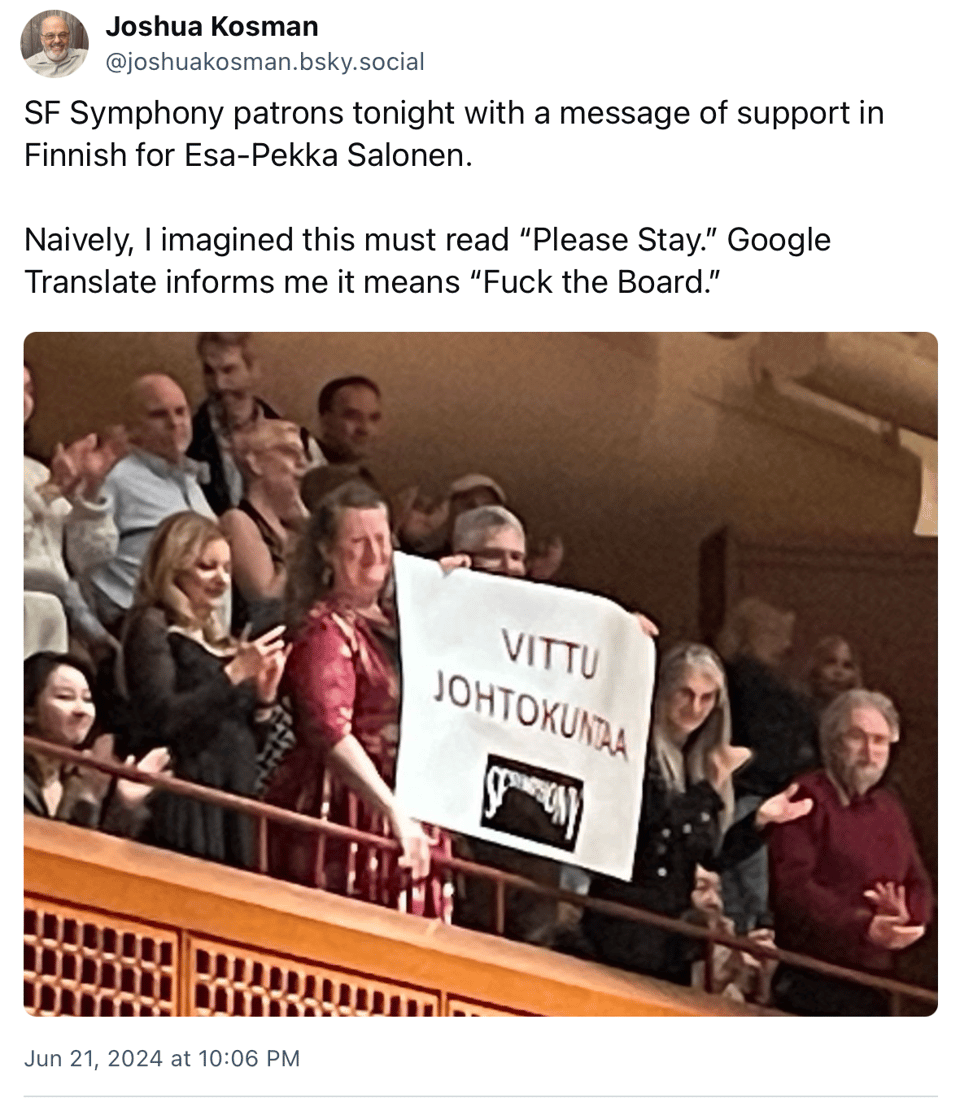
The SFS board freaked out and threatened to ban this patron from Davies Hall. Said patron has reached out to the ACLU. These are not Normal Orchestra Things. (This is more insane than the time I found myself part of the LA Phil Orgasm Story.) Emily once again had a lot of fun with this:
Women who have been attending the symphony since 1991 are the best demographic to alienate and antagonize. The more loyal the customer, the more urgent a matter it is to ban them from your business’s premises. All for-profit corporations know this, and it’s time we start running our non-profits more like for-profits. There is an old saying in the world of business: “The customer is always wrong.” Only the stupidest businessmen do not understand this.

Sometime in the midst of all this, a bunch of SFS patrons banded together and launched The San Francisco Symphony Patrons Alliance, with a spiffy website explaining their concerns about the SFS leadership and taking action. (The website is, I think, the best place for updates on the situation.)
Then Jen Wu got wind via her union of some horrifying proposed budget cuts of 80% to the SFS Chorus:
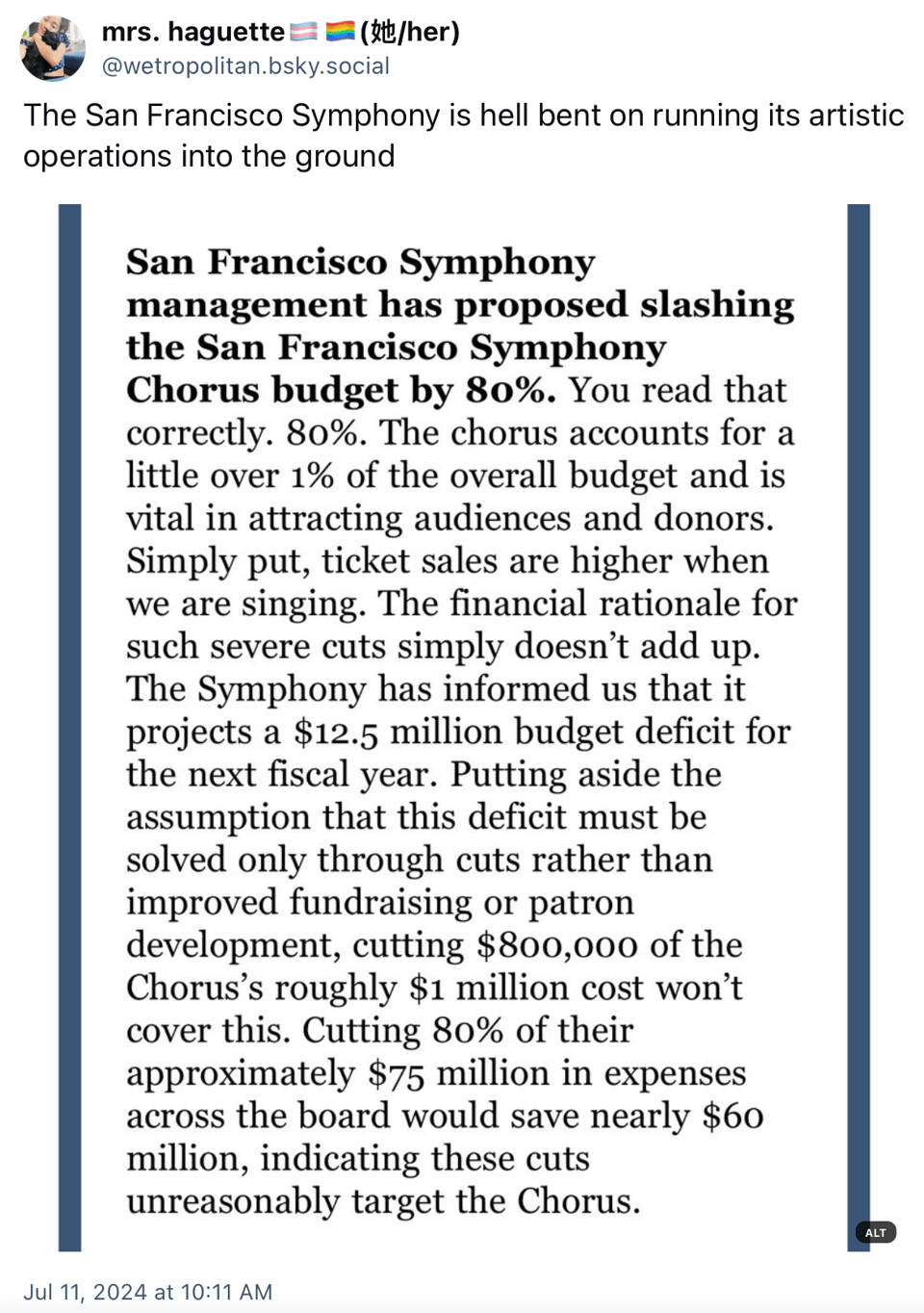
As Jen pointed out in an Instagram video, the SFS Chorus, which only uses 1% of the SFS budget to begin with, is already underpaid by the standards of major American orchestra choruses; of the 150 members of the Chorus, only 32 are paid, and this is before these budget cuts.
Musicology Duck wrote a thread about why slashing the budget for an orchestral chorus is very short-sighted, shooting-yourself-in-the-foot nonsense:
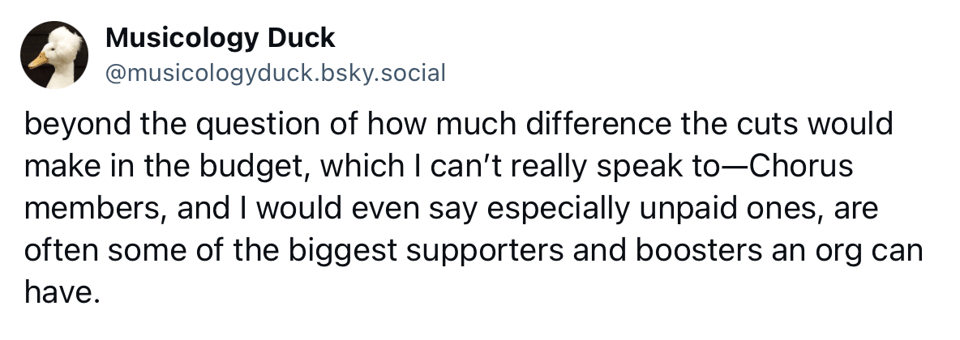
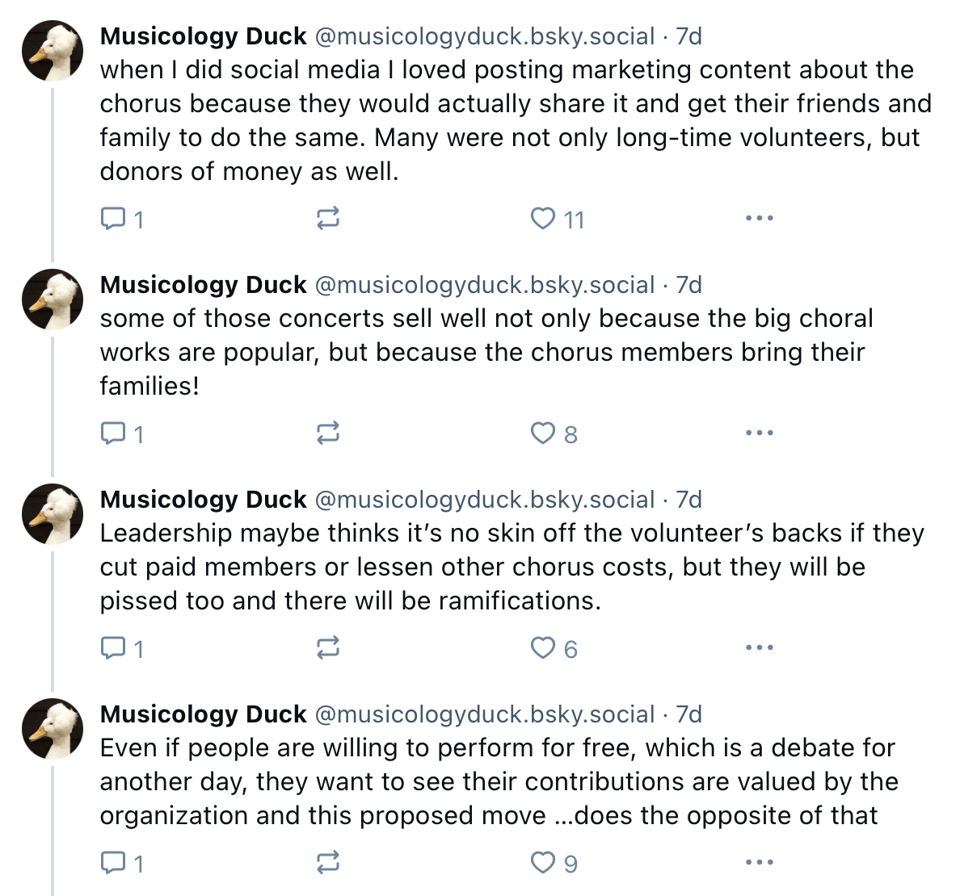
If you are a reasonable observer, you might be wondering, “Why is the SFS board leadership not renewing their musicians’ contracts, not looking for a music director, slashing budgets, canceling tours, and cutting programs?” Same, reasonable observer, same.
The explanation that crops up again and again is the unconfirmed rumor that leadership is exploring a merging of the SF Symphony and the SF Opera. As the Patrons Alliance points out:
- The current contract for SF Opera orchestra musicians will expire on July 31, 2024.
- The SF Opera has also been pushing a narrative of financial hardship and has reduced the number of productions next season.
- A single husband and wife team has significant control over the governance of both organizations.
This rumor was also mentioned in the SF Standard piece, and Emily wrote on it:
If it’s at all remotely true, I once again express my frustration that it is the curse of the orchestra-loving public to be forever held captive by the emotional, social, and psychological issues of the financier class. Sometimes it feels like patrons serve no purpose except to be the blurry background figures in their personal Shakespearean tragedies. To any multi-millionaires or billionaires reading, if your pasttimes include plotting to merge major American arts organizations with the help of your spouse, just — stop. There are other hobbies.
I don’t know how true this rumor is, and I have no authority to confirm it, but if this is indeed the case, I cannot believe that two great arts organizations are being gutted from the inside out and musicians’ livelihoods are being yanked around so someone can get off on being a power couple.
Whew, now we’re caught up, I think. Absolutely wild times, and all I can do as I watch the turmoil of my original home orchestra from afar is this:
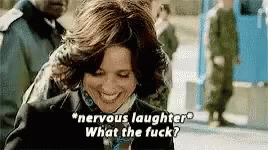
-
As always, interesting, thought-provoking,witty - and so well written. Love the Salonen "Please Stay" sign. THANK YOU for the coverage of SF Symphony - Have not heard the rumor re consolidation with Opera. Oh gawd - The chutzpah.
-
Call me a philistine, but I subscribed solely (well, OK, not SOLELY) to find out what you're driving these days. Maybe I'll browse the archive! Came here via Emily, whose entire oeuvre is a miracle to me.
Add a comment: